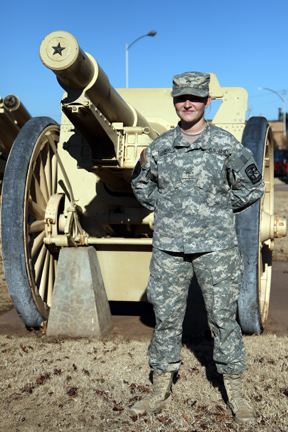Sometimes the best ideas are the simplest ones.
Needing to raise funds to send a group of Oklahoma State University ROTC cadets to the annual Bataan Memorial March in New Mexico, CDT Addy Brongo came up with a plan as simple and effective as a wakeup bugle call.
She devised a plan to bring the ROTC push-up board out to OSU football fans and ask for donations. The push-up board is one of the most visible and revered traditions at OSU games, with the cadets lifting the board and executing pushups after every Cowboys touchdown.
The concept proved to be a huge hit, with people donating money for the chance to get on the board and do pushups themselves or to just take a photo next to it. Brongo’s plan raised enough money to pay for travel, food, and registration for nine cadets to participate in the March.
“Most people were very willing to help us out,” Brongo says. 
Of the nine cadets to participate, though, Brongo was the only female. Far from letting that intimidate her, she instead embraced the challenge and used it as motivation.
“You want to be on the same level with the guys because you’re around them all the time,” she says.
Brongo comes by her attraction to the military naturally. Her father enlisted when he was a young man and she has two uncles who served in the U.S. Navy. Not only that, she received a hands-on education as a child.
“Every vacation we ever went on we went to military museums or airfields,” she says. “The amount of pictures I have of me with cannons is ridiculous.”
Such exposure continually stoked her interest in the military and when it came to choose a university (her academic achievements gave her many options) she hungrily researched those with ROTC programs. From her home in Orange County, California, she cast a wide net before deciding on OSU.
Her gender gave her no trepidation about following a path in the military. Any jitters she may have had quickly vanished when she was introduced to the program. “Everybody was very friendly and welcoming,” she says.
And while the number of female cadets does not yet rival the number of males, they are especially invested in each other’s success.
“You become very close with the other females,” Brongo notes.
Regardless of gender, the ROTC program is built to train leaders. Taking a mix of students who may have experience in the National Guard as well as those who have little-to-no military background at all, every student takes an introductory military science course. This course is often taken as an elective and counts for credit in many majors at OSU.
Most students are not eligible to contract with the Army ROTC until after their freshman year, a fact that is often overlooked. With no commitment until they have amassed 30 credit hours toward their degree, students are able to assess the program and decide if they would like to continue. A good number do just that, in no small part because of the leadership opportunities it offers.
“There are lots of opportunities to step up and be a part of something,” Brongo says.
Stepping up to meet a challenge is something Brongo has embraced, even meeting the challenge of serving as one of a handful of female cadets.
“It was a different environment than I was used to but I think it was helpful because while I don’t feel I have to prove myself, I want to prove myself.”
